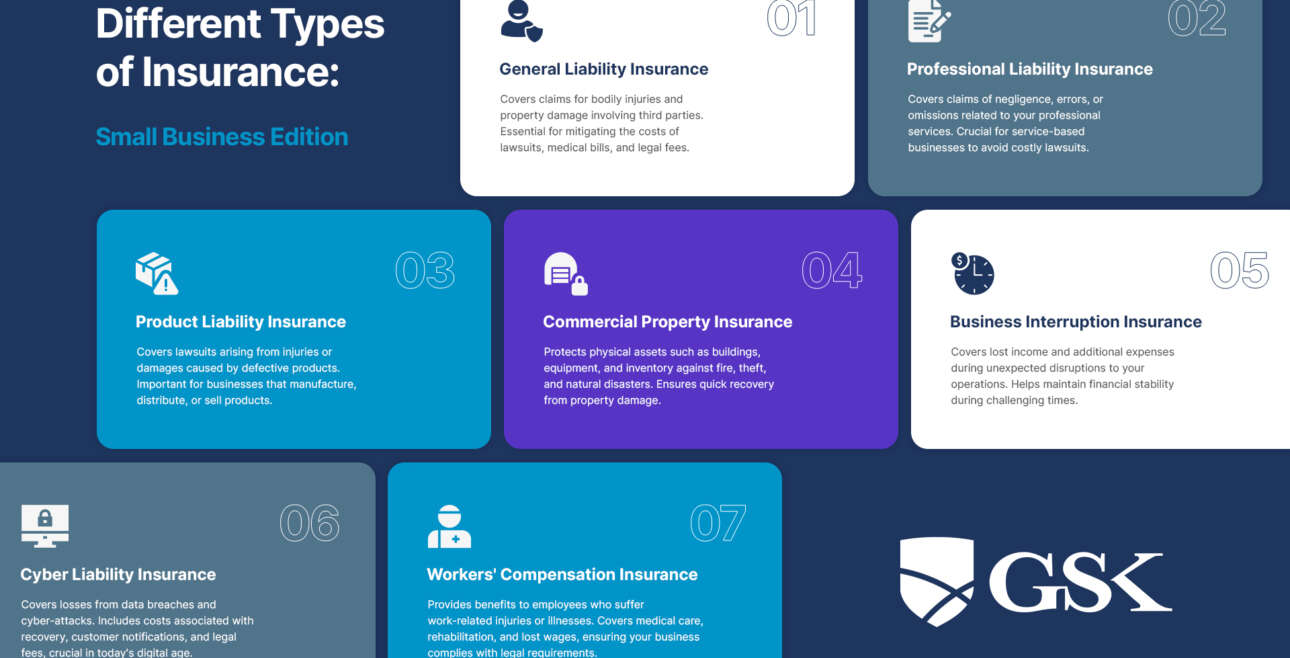Starting and running a small business involves managing numerous risks daily. Whether it’s damage to property, legal liabilities, or disruptions in operations, the right insurance acts as a safeguard, helping you navigate uncertainties with confidence. Common risks that small business owners face include theft, natural disasters, accidents on the premises, data breaches, and litigation from dissatisfied clients or injured employees. Without adequate protection, these risks can not only disrupt day-to-day operations but can also threaten the financial integrity and future of your business.
The purpose of this article is to guide you, the small business owner, through the complexities of business insurance. We’ll help you understand the various types of insurance available and identify which ones are crucial for your specific business needs, ensuring that you’re well-prepared and well-protected on your entrepreneurial journey.
Understanding Business Insurance
Business insurance is a broad term encompassing various policies designed to protect businesses against specific risks and liabilities they face during their operations. This protection can cover losses from events such as property damage, theft, liability, employee injury, and business interruption. Each policy is tailored to address different aspects of risk depending on the nature and needs of the business.
Insurance plays a crucial role in risk management for small businesses. It provides a financial safety net that allows business owners to recover more quickly from unexpected events. Effectively, it mitigates the financial impact of incidents that could otherwise drain resources or even force the business to close. By transferring the risk to an insurance company, business owners can focus more on growth and less on the potential setbacks caused by unforeseen circumstances.

Types of Business Insurance
General Liability Insurance
General Liability Insurance covers claims related to bodily injuries and property damage involving your customers or other third parties. This insurance is crucial as it protects against the financial burden of lawsuits, including medical expenses and legal fees, ensuring your business can survive these potential setbacks.
Professional Liability Insurance
Professional Liability Insurance, or Errors and Omissions Insurance, is designed for service-based businesses like consultants and accountants. It covers claims of negligence or mistakes in the services provided that could financially harm clients. This insurance safeguards your business from costly legal battles and settlements resulting from professional advice.
Product Liability Insurance
Product Liability Insurance is vital for businesses that make, distribute, or sell products. It protects against lawsuits caused by injuries or damage due to product defects. This insurance helps cover legal costs and damages, protecting your business from potentially crippling financial consequences.
Commercial Property Insurance
Commercial Property Insurance protects your business’s physical assets—like your building, equipment, and inventory—against damage from fires, theft, or natural disasters. Whether you own or lease your space, this insurance is key to quickly recovering and resuming operations after such events.
Business Interruption Insurance
Business Interruption Insurance is essential for covering lost income and extra expenses when unexpected events disrupt your business operations. This coverage helps maintain your business’s financial health and assists in resuming normal operations without significant economic hardship.
Cyber Liability Insurance
Cyber Liability Insurance is increasingly crucial as digital threats grow. This insurance covers losses from data breaches and cyber-attacks, including recovery costs like customer notifications and legal fees. It’s essential for protecting both your business and customer data in the digital age.
Workers’ Compensation Insurance
Workers’ Compensation Insurance is mandatory in most places and covers employees who get injured or sick due to their job. It helps pay for medical care, recovery costs, and lost wages, shielding your business from related legal issues and ensuring employees are cared for.
How to Determine What Insurance Your Business Needs
Factors Influencing Insurance Needs
The insurance needs of your business are influenced by several key factors. Your industry dictates the specific risks you face—construction firms and design studios, for example, have very different insurance requirements, especially concerning liability and property damage. The size of your business impacts the level of coverage needed; larger companies generally need more comprehensive insurance. Location also plays a critical role; businesses in areas prone to natural disasters like floods or earthquakes may need specialised coverage to handle these risks.
Assessing Your Business’s Specific Risks
To properly determine the insurance you need, start with a detailed risk assessment of your business operations. Look at all areas of your business to identify potential risks in legal liabilities, financial processes, or physical assets. Focus on the most critical risks first, prioritising them based on their potential impact. As your business grows or changes, it’s important to periodically update your risk assessment to ensure your insurance coverage remains appropriate and effective.
The Importance of Consulting with Insurance Professionals
Understanding business insurance can be complex, which is why consulting with insurance experts like those at GSK Insurance is beneficial. These professionals have a deep understanding of various insurance options and can guide you to the best choices for your specific needs. They can customise policies to fit your business perfectly, ensuring you have adequate coverage without overspending. Additionally, in the event of a claim, having an insurance expert on your side can help streamline the process and ensure fair treatment from insurers.
Cost of Business Insurance
Several key factors influence the cost of your business insurance premiums. The type of industry affects the risk level, with higher-risk industries, like construction or manufacturing, often paying more. Business size is another factor; larger businesses with more employees or assets typically face higher premiums. Your claims history also plays a role; frequent claims can increase costs, as can the location of your business, the value of your assets, and the level of coverage needed.
Tips on How to Manage and Reduce Insurance Costs
Here are some ways to manage and lower your insurance costs:
Review Policies Regularly: Make sure your coverage matches your current business needs, and remove any unnecessary policies or excess coverage.
Bundle Policies: Buying multiple types of insurance from the same provider can result in discounts.
Risk Management: Implementing safety protocols, cybersecurity measures, and employee training can lower premiums by reducing the likelihood of claims.
Shop Around: Compare quotes from different insurers to find the best prices for the coverage you need.
Common Mistakes to Avoid
A common mistake is underestimating the coverage needed, leaving your business vulnerable to significant financial losses. Opting for the cheapest policy can also lead to inadequate protection, as low-cost policies may have limited coverage, high deductibles, or exclusions that fail to protect key areas.
Many businesses overlook specific risks like cyber security and employee theft, which can lead to costly losses and legal action. To avoid these pitfalls, ensure your insurance offers comprehensive coverage tailored to your business needs, including protection against modern threats.
Peace of Mind for Your Business
Choosing the right business insurance is crucial to safeguarding your business against financial losses from various risks, including lawsuits, natural disasters, cyber-attacks, and internal threats. Adequate coverage provides a safety net, allowing you to focus on growth and success without worrying about unexpected setbacks.
To ensure your business has the comprehensive protection it needs, consider contacting GSK Insurance for a personalised consultation. Our experts will assess your specific needs and tailor a policy to fit, avoiding overinsurance or gaps in coverage.
We invite you to speak with a GSK Insurance professional today to discuss your insurance needs and secure the right protection for your business’s future success.


